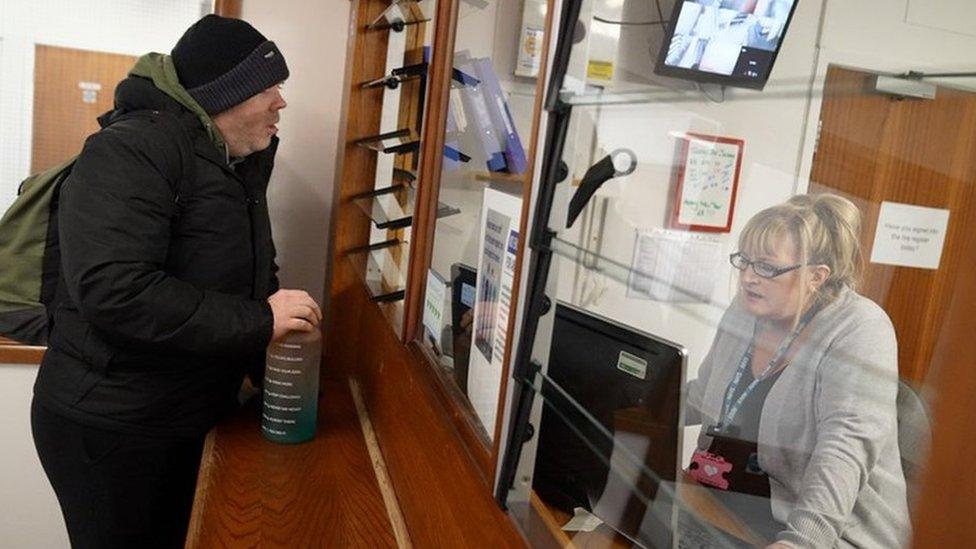GP practice closures increase NHS pressure
- Published
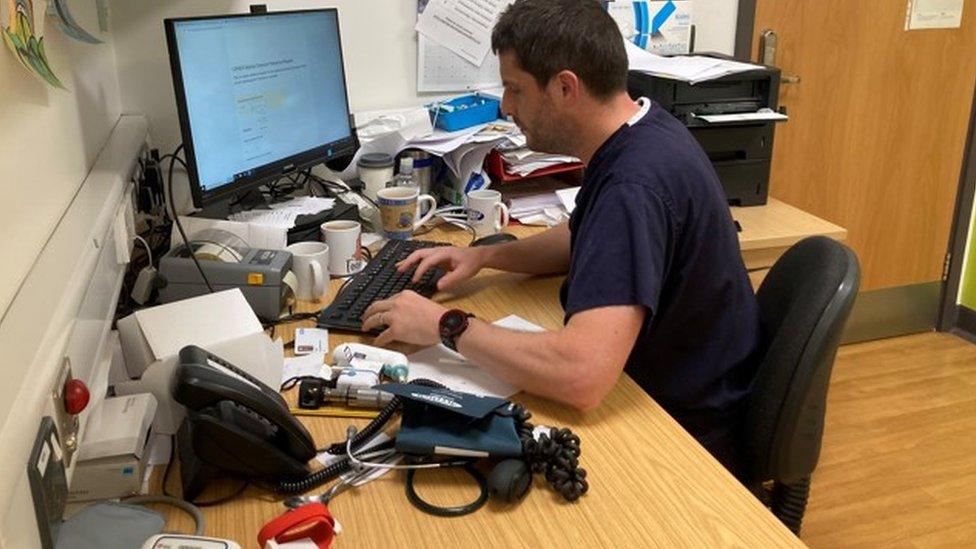
Dr Paul Evans previously served as a British Army doctor in Iraq and Afghanistan
Almost 200 GP surgeries closed in England between 2018-2022, impacting more than 650,000 patients, figures show.
Data shared with the BBC's File on 4, comes from a Freedom of Information request by the Labour Party and excludes merging practices.
It means GPs like Dr Paul Evans, who works in Gateshead, have taken on hundreds of additional patients.
The BBC spent the week at the Bridges Medical Practice to see how pressures are affecting doctors and patients.
It's a Monday morning and the 8 o'clock rush is just beginning. The phone has not stopped ringing.
GPs are working through a queue of patients already, while receptionists are dealing with rising temperatures in the waiting room.
Joanne, the practice manager, tells us that she has "just had somebody kicking off at reception". He was 13 minutes late for his appointment. The receptionist was trying to deal with it but he "was getting very irate".
Dr Evans is down the corridor. He's 43 and the sole partner at Bridges Medical Practice and also serves on the British Medical Association's (BMA) GP committee.
Hanging from a peg in his office is running gear in military green and under the desk a pair of army desert boots - clues to his previous life as a doctor in the British Army.
Having served in Afghanistan and Iraq, he has experience of working in challenging conditions and relished his former job.
"We felt like we were part of something bigger," he says. "The system largely worked. From front line wounding, to point of care, to hospital care in Iraq, Afghanistan and all the way back to the UK. Things worked."
When we asked for the comparison to the NHS system today, his observations are striking.
"In the NHS it feels like things aren't working and it feels like actually things are just getting worse little by little, year by year.
"Things that we used to take for granted, services that used to exist don't now. Increasingly, it just feels like the system is breaking and indeed being broken."
Life expectancy
To comprehend the challenges his surgery faces, it is important to understand where it is.
The front doors are just 200 metres from the River Tyne.
Even though the centre of Gateshead has been redeveloped, attracting younger households, there is a lingering air of deprivation.
Just off the main street are rows of boarded-up shops, there are many overweight teenagers and plenty of smoking pensioners.
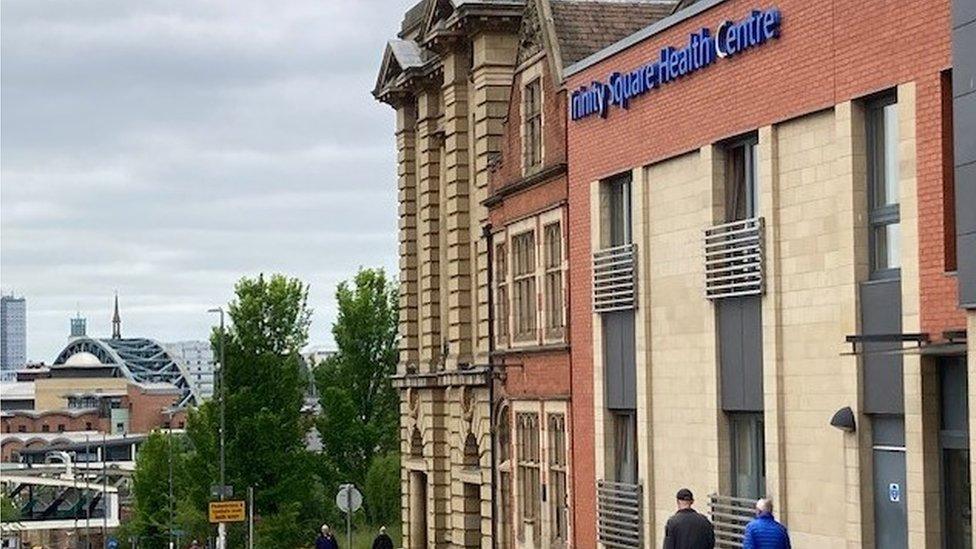
The surgery is located in the centre of Gateshead, a few metres from a Tesco supermarket and range of shops
Government figures, external show life expectancy for a man living in Gateshead is about seven years lower than more wealthy areas of the North East, some just a few miles away.
This is Dr Evans' patch and it is clear to see why he is busier than most GPs.
Back inside, we meet George.
"I've got 18 health problems," he tells us. "Chronic kidney disease. Heart disease. I've got vasculitis, arthritis, rheumatoid arthritis, osteoarthritis. Loads of stuff."
George, whose name we have changed, says his social housing is damp and dirty and it aggravates his ill health, and outside youths terrorise and taunt him.
His contact with Dr Evans is all that is keeping him going.
"I think it's due to him that I'm still here," he says.
Dr Evans tells us some of the reasons he believes GPs are seeing more patients than ever before.
"For many of these people we are the first port of call, in part because so many other ports of call have been removed by successive funding cuts to mental health services and to community and council services."
GP's death
Last November the Bridges Medical Practice had about 7,000 patients.
Then, the following month, the doctor at another local practice suddenly died.
Since then Dr Evans' practice has taken on an additional 700 patients, who were either transferred over or chose to register with his surgery.
"There's a significant effect when any GP practice closes. Patient numbers don't go down, even if practice numbers do. The same number of patients still live in Gateshead and still need to be seen."
Dr Evans says the process of transferring patients from the practice that closed to neighbouring surgeries was managed well by the local Integrated Care Board (ICB), but if this is not done carefully a sudden influx of new patients could "capsize" neighbouring practices that are already struggling to cope.
The closure of some surgeries reflects a decline in the overall number of GPs in England over the past eight years.
Since 2015 the number of fully trained, full-time equivalent (FTE) GPs has fallen by more than 2,000.
The government says record numbers of GPs are now being trained and its NHS workforce plan will further increase the numbers being trained each year, from 4,000 to 6,000 by the start of the next decade.
It also says it has recruited an additional 26,000 staff to work in primary care, such as pharmacists and paramedics, and is spending £240m to help cut waiting lists and make it easier for patients to get an appointment with their family doctor.
Shadow Health Secretary Wes Streeting said: "After 13 years of Conservative failure to train enough doctors, patients are struggling just to get an appointment with a GP.
"Practices are shutting up shop across the country, leaving some patients travelling miles for appointments, and GPs overburdened with more and more patients to care for."
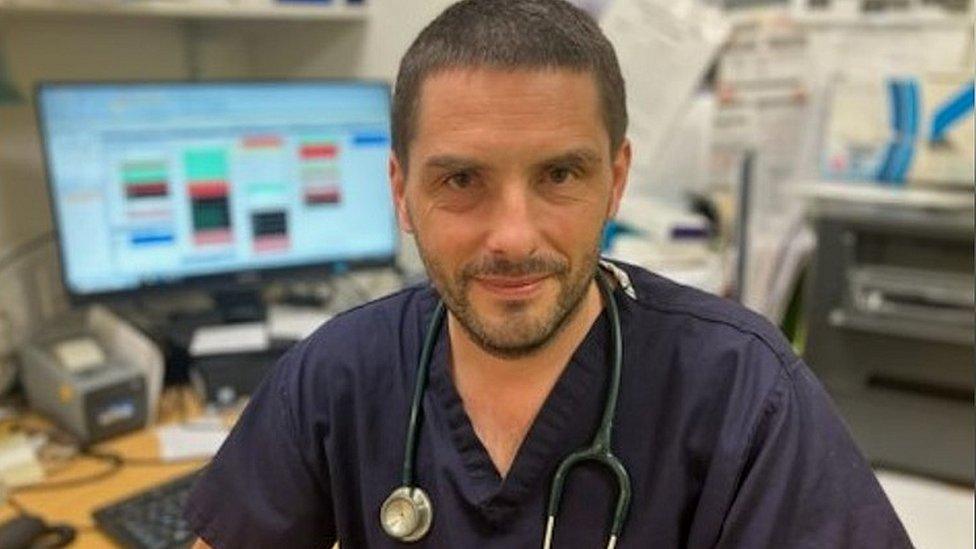
Paul Evans says he has no choice but to exceed the "safe" number of patients seen each day
GPs also have to keep in mind the recommended "safe" number of patients a doctor can see daily.
According to the BMA, it is 25 but Dr Evans tells us he sees closer to double each day.
He tells us if he were to stick to that recommendation it would mean "longer waiting times to see GPs".
"That would end up with people besieging urgent treatment centres, minor injury centres, walk-in centres, emergency departments. The demand would end up somewhere."
Dr Evans currently manages to make it work, but admits "right now, in terms of work, leisure balance it's firmly weighted in favour of work I'm afraid".
His wife, Elizabeth, is an associate professor in the Department of Psychology at Durham University.
She tells us: "I think it helps that it's very fulfilling to him. He's ex-army and I suspect that the work ethic and the aspect of sort of compartmentalization is probably what helps keep him ticking."
Listen to File on 4: GPs on the Front Line from 20:00 on BBC Radio 4 or on BBC Sounds

Follow BBC North East & Cumbria on Twitter, external, Facebook, external and Instagram, external. Send your story ideas to northeastandcumbria@bbc.co.uk, external.
Related topics
- Published9 May 2023
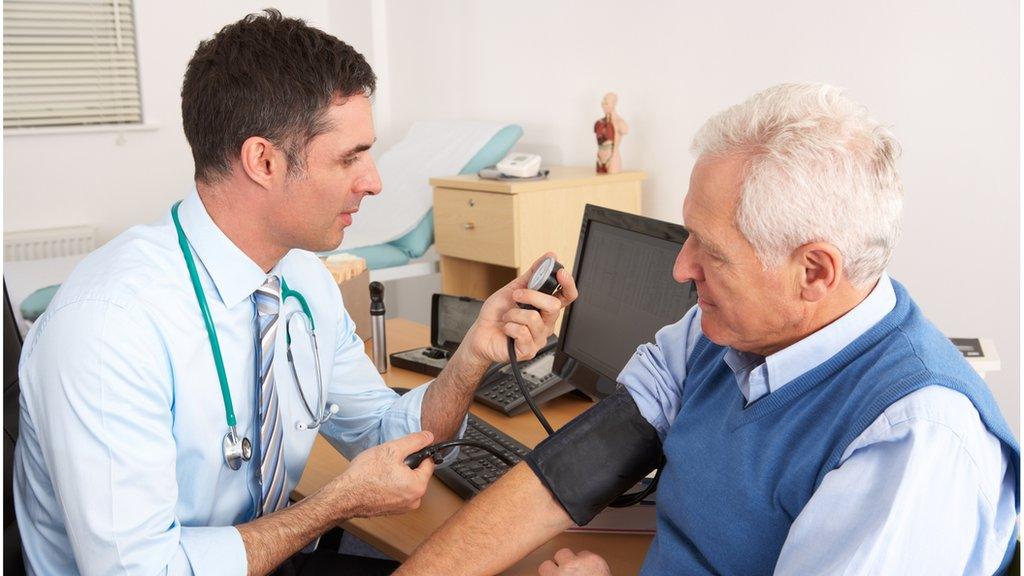
- Published7 March 2023
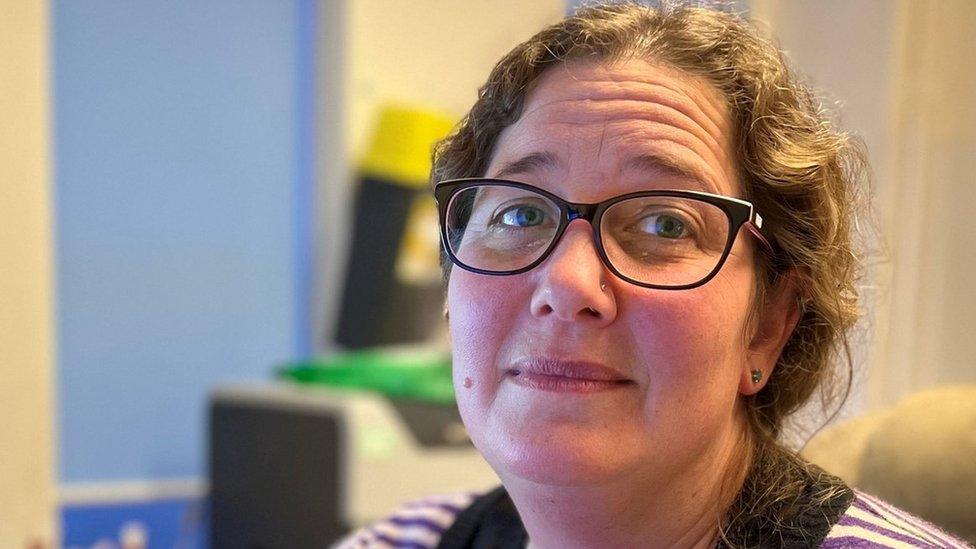
- Published4 January 2023
